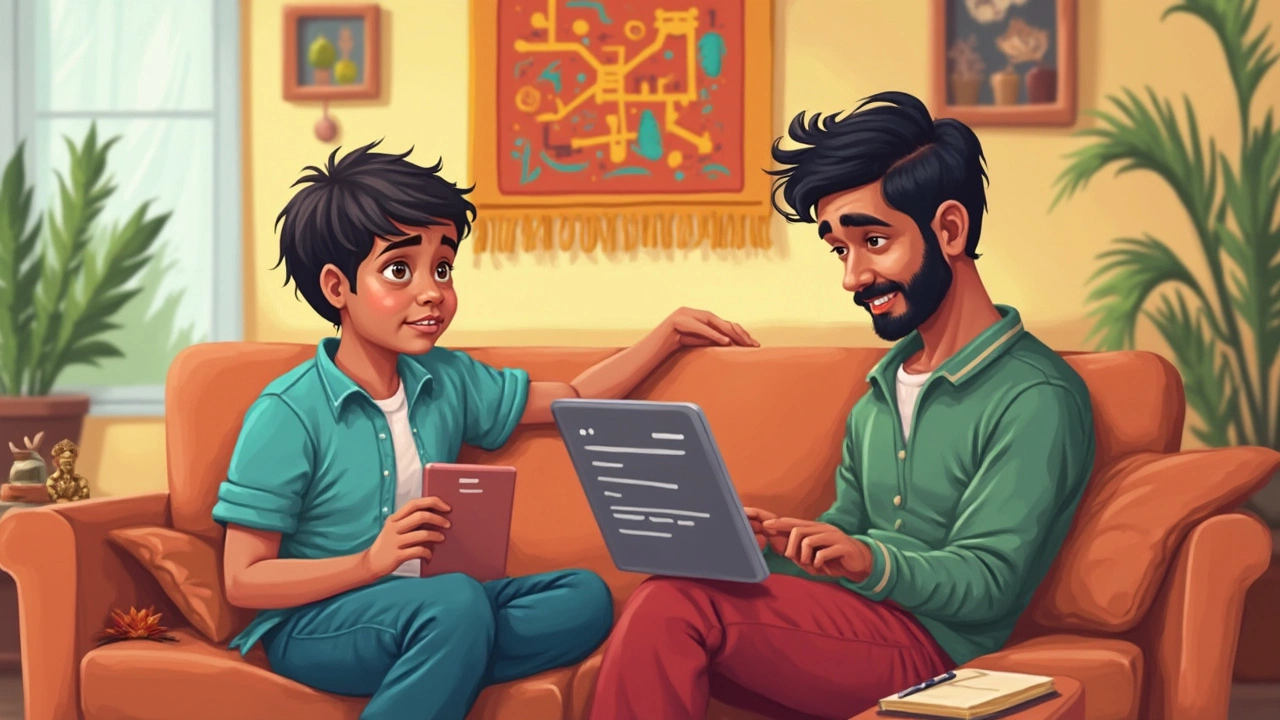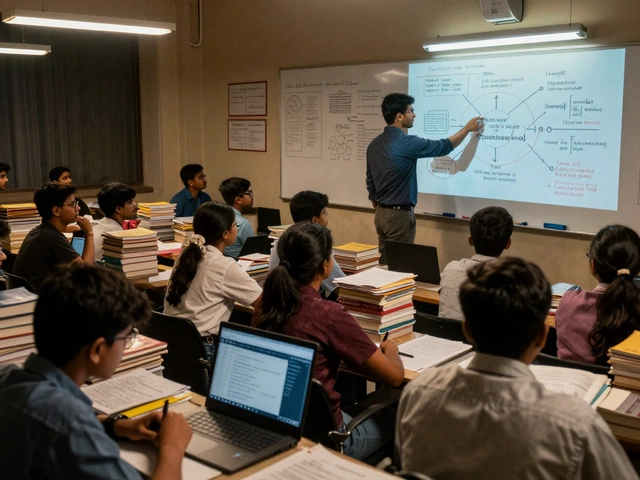So, you're thinking about diving into the world of coding, huh? It's a brave new world! A lot of people picture coding almost like learning a foreign language. And in some ways, it kind of is. But fear not—it’s not as scary as you might think. The trick is to start with the basics and not overwhelm yourself.
Imagine you've just picked up a book in a language you don't know. You wouldn't expect to understand it instantly, right? Coding is no different. Starting small makes all the difference. Choose a programming language tailored for beginners, like Python. It's famous for its easy syntax, almost like writing in English.
The internet is bursting with free resources. From YouTube tutorials to interactive homework on platforms like Codecademy, the world is your coding oyster. Just make sure to take it one lesson at a time. And don't worry about understanding everything immediately—practice truly does make perfect.
- Why Coding Seems Scary
- Choosing the First Language
- Resources for Beginners
- Overcoming Common Obstacles
- Staying Motivated
- The Joy of Creating with Code
Why Coding Seems Scary
When most folks think about coding, they picture lines and lines of gibberish with a ton of symbols they'd only ever see on their keyboard if their cat decided to have a stroll on it. This image can be a bit off-putting for someone just stepping into coding classes. But let’s unwrap what's behind this fear.
It's All Greek to Me!
The biggest fear? It looks like a foreign language. And guess what? To some extent, it is. Programming languages have their own set of rules and vocabulary. But unlike spoken languages, you don’t have to master them all—just grasp the basics of one to start with. Getting comfortable with one language, like Python or JavaScript, automatically makes learning others way easier down the line.
No Experience, No Problem!
Another reason it seems scary is the perception that you need a tech background. The truth? Not at all! Many successful coders today didn't start with computer science degrees. They started with programming basics and built up from there. Coding is more about problem-solving and creativity than anything else.
And Then There's the Myth of Math
There's this big myth that you have to be a math whiz to code. But here's some good news: for most entry-level beginner coding, basic math skills are more than enough. Sure, if you're heading into fields like machine learning, you'd need a tad more math. But don't let that stop you from jumping in at the beginning.
Here's a handy little table showing perceptions of difficulty from new coders:
| Reason | Percentage |
|---|---|
| Fear of Failure | 40% |
| Lack of Resources | 25% |
| Complexity of Languages | 35% |
Hopefully, that convinces you that coding doesn't need to be this big, scary monster. With the right mindset and resources, you can tackle the beginner jitters and even have fun doing it!
Choosing the First Language
Picking the right programming language is like choosing the right partner for a dance. You want something that's going to guide you smoothly and not trip you up at every turn. For beginners, one of the best starting points is Python. Why? It's got a reputation for having a simple syntax that's often described as 'readable' and 'easy to learn'. Think of Python as the friendly teacher of the coding world.
JavaScript is another popular choice, especially if you're leaning towards web development. It's versatile and widely used across the internet. Plus, with JavaScript, you get instant feedback on your code’s effect, which is pretty rewarding as you start your journey.
Coding classes and platforms often recommend starting with these languages because they give you a taste of what coding is all about while not being overly complex. Let's be real, diving headfirst into a more complex language like C++ can feel like trying to read a novel before you've learned the alphabet.
Factors to Consider
- Purpose: What do you want to do? Web apps, data analysis, or maybe game design? Your end goal can guide your choice.
- Community Support: A language with a large community means tons of resources and forums for when you're stuck.
- Future Opportunities: Consider job trends and demand if a career in coding is your aim.
No matter which language you choose, remember, it's all about practice and patience. There's no 'wrong' language to start with, it's just about finding what clicks with you.
Resources for Beginners
Alright, so you’ve decided to step into the world of coding classes. Lucky for you, living in 2025 means you’ve got a treasure trove of resources right at your fingertips. But where do you start? Don't worry, let's break it down.
Online Courses
Online courses are a fantastic way to learn at your own pace. Platforms like Codecademy, Coursera, and Udacity offer structured courses specifically designed for beginners. They often include interactive lessons and hands-on projects which is super helpful. Codecademy is especially known for its beginner-friendly environment where you can practice writing code directly in your browser, no installation needed!
Video Tutorials
If you’re more of a visual learner, YouTube is your best friend. Creators like Kevin Naughton Jr. and The Net Ninja offer detailed, easy-to-follow tutorials. They cover everything from the basics of Python to more intricate topics like web development. Plus, seeing someone code in real-time can make a world of difference.
Coding Communities
Don’t underestimate the value of getting involved with online coding communities. Websites like Stack Overflow and Reddit’s learnprogramming section are goldmines. You can ask questions, find answers to problems you encounter, and feel connected to others on the same journey as you.
Books
Some folks prefer the traditional route and that's perfectly okay! There are plenty of beginner-friendly books out there. “Automate the Boring Stuff with Python” by Al Sweigart is a classic recommendation. It's practical and gets right down to creating useful programs quickly.
Coding Games
Want to have fun while you learn? Try coding games like CodeCombat or HackerRank. These platforms turn coding into a game, offering challenges that keep you engaged and learning without feeling like you’re doing dry, boring exercises.
Meetups and Workshops
If you're the social type, check out local coding meetups or workshops. Websites like Meetup.com can connect you with other beginners and mentors in your area. Many parts of the world host free programming workshops that can give you hands-on experience with guidance from experienced coders.
Remember, the key is to find resources that suit your learning style and keep it fun. Happy coding!

Overcoming Common Obstacles
Learning to code is a journey with a few bumps along the way, but don't worry—it's all part of the process. Let's unpack some common hurdles and how you can tackle them. Trust me, you're not alone in this.
Feeling Overwhelmed
This is probably the biggest challenge for beginners. Everything seems so new and complex. The trick? Break things down into bite-sized pieces. Focus on one concept at a time, like loops or if-statements. Too much too soon can be a recipe for frustration. Remember, Rome wasn't built in a day, and your coding skills won't be either!
Debugging Nightmares
Errors in your code might seem daunting, but debugging is just part of coding life. When you hit a brick wall, take a breather, or google for solutions. There's a huge developer community ready to help. As developers often say, “Solve one bug, gain two lessons.”
You don't really understand something unless you can explain it to your grandmother. - Albert Einstein
Lack of Motivation
It happens to the best of us—our enthusiasm hits a low point. Find a fun project to work on or join a coding community. Connecting with others keeps you motivated and makes the journey more enjoyable. You could also set small goals—progress is a great motivator!
Imposter Syndrome
This sneaky feeling can creep in no matter where you're at in your coding journey. A little secret? Everyone struggles with self-doubt sometimes. The important thing is to keep going. Build small projects, gain confidence, and you'll see your skills grow.
By transforming obstacles into stepping stones, you'll not only improve your coding skills but also become a more resilient learner. Stay curious, keep experimenting, and remember—you've got this.
Staying Motivated
Learning to code requires a lot of perseverance. It’s easy to feel overwhelmed, especially when you hit a coding wall. But don’t let that stop you!
Break it Down
Big projects can seem intimidating. Break them into smaller tasks. Instead of looking at the entire app or website, focus on a login page or a single function. This makes the work more manageable and gives you a sense of achievement every step of the way.
“The only way to learn a new programming language is by writing programs in it.” - Dennis Ritchie
Set Realistic Goals
Create short-term goals to map out your progress. Want to master loops in Python this week? Great! Ticking off these mini-goals keeps you on track and provides little wins to celebrate along the way.
Join a Community
You’re not alone on this coding journey. Join forums like Stack Overflow or Reddit's coding community. Engaging with others keeps you accountable and helps when you're stuck.
- Ask questions. Nobody knows everything.
- Share your knowledge. Teaching others can reinforce what you’ve learned.
Staying motivated is all about finding what works for you. Track your progress in a journal or make use of apps designed to keep you focused. Remember, every programmer was once a beginner, just like you.
The Joy of Creating with Code
Ever built something from scratch and felt like a champ after? That's what coding can do for you. There's a special thrill in seeing something you've created come to life, right there on your screen. The journey from nothing to a functioning application or game is magic, minus the wand. It’s an everyday miracle, really, and that’s what keeps people coming back to learn to code.
Coding classes often emphasize practical projects to tap into this very joy. Imagine creating a simple game: you start with a blank page and, step by step, introduce characters, define rules, and program reactions. Before long, you're not just a spectator—you’re a creator. Python, for example, is a favorite for beginners as it's quite straightforward yet powerful enough to create impressive projects.
Build and Share
Once you've built something, the next step is sharing it with others. It’s like the virtual version of showing off something cool. Platforms like GitHub let you do just that—sharing your code with a community that’s as enthusiastic as you are. This not only boosts your confidence but also opens doors to feedback and collaborations.
Problem Solving is Key
As you code, you learn to troubleshoot. Encountering bugs might be initially frustrating, but solving them is incredibly satisfying. It's like a puzzle waiting to be solved. Plus, each solved problem boosts your skills. Who doesn't love feeling that sense of growth?
| Programming Language | Ease for Beginners |
|---|---|
| Python | High |
| JavaScript | Moderate |
| C++ | Low |
So, if you're still on the fence about getting into coding, think about the freedom and satisfaction of creating something that didn’t exist before. From entertainment to practical solutions, you’ll be able to bring ideas to life. It’s about the joy of creation, the thrill of learning, and the satisfaction of solving problems.





